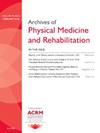Validation of an Eight-item Resilience Scale for Inpatients with Spinal Cord Injuries in a Rehabilitation Hospital: Exploratory Factor Analyses and Item Response Theory 1133
IF 3.6
2区 医学
Q1 REHABILITATION
Archives of physical medicine and rehabilitation
Pub Date : 2025-04-01
DOI:10.1016/j.apmr.2025.01.030
引用次数: 0
Abstract
Objectives
To validate the factor validity and discrimination ability of a resilience scale, CD-RISC-10, for clinical usage in adults with SCI during hospitalization.
Design
Nighty-three adults with spinal cord injury responded to the self-reported survey, including CD-RISC-10, the Patient Health Questionnaire-9 Scale, the Satisfaction with Life Scale, and the Intrinsic Spirituality Scale. We conducted descriptive statistics, exploratory factor analysis, and item response theory. Item response theory analysis was completed in R software (ie, “ltm” package).
Setting
A medical center including rehabilitation care.
Participants
Nighty-three people with spinal cord injury undergoing inpatient rehabilitation in a medical center in the Southern US inclusion criteria were: diagnosis of SCI with either traumatic or acquired, complete or incomplete, or multitrauma injuries; ≥18 years old, and able to respond to an assessment in English. Consistent with the IRB advice, we welcomed any gender, sex, and race/ethnicity as long as individuals met the inclusion criteria. A convenience and volunteer sampling approach was applied.
Interventions
Not applicable.
Main Outcome Measures
(1) The CD-RISC-10 assesses one latent factor of resilience. The measure consists of 10 items, using a 5-point Likert scale ranging from 0 (not true at all) to 4 (true nearly all of the time). (2) The Patient Health Questionnaire-9 Depression Scale is a brief 9-item self-report measure of depressive symptoms. Each item is rated on a 4-point Likert-type scale ranging from 0 (not at all) to 3 (nearly every day). (3) The Satisfaction with Life Scale has been one of the most widely used life satisfaction measures, largely because of its brevity of only 5 items. Participants indicate their degree of agreement with each item using a 7-point Likert-type scale, with scores ranging from 1 (strongly disagree) to 7 (strongly agree). (4) The Intrinsic Spirituality Scale measures intrinsic spirituality. The Intrinsic Spirituality Scale is a 6-item measure that uses a sentence completion format where an incomplete sentence fragment is provided, followed by 2 phrases anchoring each end of the scale.
Results
Two items were deleted from CD-RISC-10 after exploratory factor analysis, forming CD-RISC-8. The item discriminations of the remaining 8 items from the unconstrained item response theory model ranged from a high of 3.071 to a relatively low 1.433. CD-RISC-8 is significantly related to Patient Health Questionnaire-9 Scale and Satisfaction with Life Scale.
Conclusions
The factor validity of the CD-RISC-8 was improved. Significantly, the CD-RISC-8 has excellent potential for clinical usage due to its discriminant ability between low and intermediate resilience.
Disclosures
none.
求助全文
约1分钟内获得全文
求助全文
来源期刊
CiteScore
6.20
自引率
4.70%
发文量
495
审稿时长
38 days
期刊介绍:
The Archives of Physical Medicine and Rehabilitation publishes original, peer-reviewed research and clinical reports on important trends and developments in physical medicine and rehabilitation and related fields. This international journal brings researchers and clinicians authoritative information on the therapeutic utilization of physical, behavioral and pharmaceutical agents in providing comprehensive care for individuals with chronic illness and disabilities.
Archives began publication in 1920, publishes monthly, and is the official journal of the American Congress of Rehabilitation Medicine. Its papers are cited more often than any other rehabilitation journal.

 求助内容:
求助内容: 应助结果提醒方式:
应助结果提醒方式:


